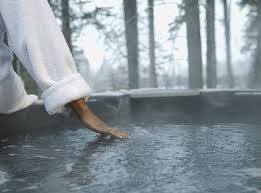Take Me to the Waters! Using Hydrotherapy as a Treatment for Depression and Combating the Winter Blues.
After spending a few days in the healing waters of Calistoga and doing a series of hot and cold-water immersions, I noticed an immediate improvement in my attitude and outlook on life. I have always believed in the healing benefits of water. The muscles are able to fully relax in warm waters and many restrictions unlock while you are floating, completely weightless. I lived in a home with a solar heated pool, and time and time again, I would see improvement and pain relief, when I floated people in the water and gave them a Watsu Massage. It is my belief that when you are weightless in water, the weight of the world disappears, and tension easily rolls out of your body. I equally enjoy the extreme sensations of cold water, after a few rounds of hot/cold water, your life force energy is stronger, your mind feels clearer, and you are more grounded in your physical body.
My short retreat was a good reminder on how to feel Relaxed and Free quickly. Since my return, I decided to do some research on Hydrotherapy and I encourage you to take advantage of the healing waters that await you. From the beginning of time, cultures have used therapeutic water or Hydrotherapy as a means to relieve aches and pains, dispel illness or in some cases to combat more severe symptoms of depression.
“Depression is a debilitating mood disorder that is among the top causes of disability worldwide. It can be characterized by a set of somatic, emotional, and behavioral symptoms, one of which is a high risk of suicide.
Women are 5 times more likely to experience depression based on the fluctuations of our unique hormonal/endocrine system. I, myself am genetically predisposed to depression. Within my maternal line, there have been several ancestors who suffered so greatly from depression that they were reported to “taking to their bed.” This meant that they were not functional. Their depression was so severe that they were disabled. The reality of their depression as well as for many others, prevented them from living normal lives. I have distinct memories of visiting a mental institution where hydrotherapy was prescribed as well as daily massage to combat severe depression.
The truth is that this is not a new treatment. In fact, Hydrotherapy has been used in the mental health field as early as the 20th century.
“Building off the idea that a dip in the water is often calming, psychiatrists of yore attempted to remedy various symptoms with corresponding liquid treatments. For instance, hyperactive patients got warm, tiring baths, while lethargic patients received stimulating sprays. Some doctors, however, got a bit too zealous about the idea, prescribing therapies that sounded more like punishment than panacea. Like many extreme treatments, hydrotherapy was eventually replaced with psychiatric drugs, which tended to be more effective and more pleasant.”
To revisit and test the hypothesis of hydrotherapy, a modern approach to treating depression has been proposed that “consists of adapted cold showers (20 °C, 2–3 min, preceded by a 5-min gradual adaptation to make the procedure less shocking) performed once or twice daily. The proposed duration of treatment is several weeks to several months.”
Evidence does appears to support the hypothesis: “Exposure to cold is known to activate the sympathetic nervous system and increase the blood level of beta-endorphin and noradrenalin and to increase synaptic release of noradrenalin in the brain.”
“Due to the high density of cold receptors in the skin, a cold shower sends an overwhelming amount of electrical impulses from peripheral nerve endings to the brain, which could result in an anti-depressive effect. Cold hydrotherapy can relieve depressive symptoms rather effectively. The therapy was also found to have a significant analgesic effect and it does not appear to have noticeable side effects or cause dependence.”
The fact is that for many of us living in Northern California, these healing waters are less than an hour drive away. They are also non-addictive. Instinctually, we know that it feel good to soak. We know it increases relaxation response in the body. What if by going to soak, you are safeguarding something very precious? What if you are protecting your mind-body connection and preventing depression and/or the winter blues? I invite you to explore your options and trust that Gaia has provided us with all we need to feel safe and sound in our physical bodies.
See you in the tubs! Amanda






Leave a Reply
Want to join the discussion?Feel free to contribute!